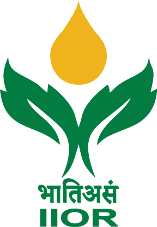
Designation
Principal Scientist
Educational qualification
Ph.D (Plant Physiology)
Division
Crop Production
Contact Address
Indian Institute of Oilseeds Research
Rajendranagar, Hyderabad
Telangana, India - 500 030
Tel No
040-24598472
Mobile No
9949700819
E-mail
ratna.pasala@icar.gov.in
pratnakumar@gmail.com
Contribution to the scientific advancement
- Identified and characterized promising sesame genotypes for cultivation under drought/rainfed conditions
- Plant bioregulators- a Promising technology developed for raising crop and water productivity.
- Evaluated, identified and developed novel plant bioregulators to maximize crop yields under water stress condition of semi-arid region of Indian Deccan Plateau and in wide range of crops like wheat, soybean, onion; and ethylene suppressor for sorghum crop stay green under water stress condition.
- Proposed redox-mediated unified mechanism for plant in-built defense through plant bioregulators under abiotic stresses.
- Promising technology- using formulation based of ortho-silicic acid for horticulture crop like watermelon for recovery after hail damage.
- Developed high through-put lysimetric system for in-situ plant water uptake, WUE/transpiration efficiency and functional root traits contributing drought tolerance in semi- arid crops
- Evaluated and identified groundnut lines out of reference collections and breeding material for intermittent drought tolerant across years and locations; Exploited variations in haulm fodder quality traits; Identified trait based intermittent drought tolerance groundnut genotypes those maintains high harvest index and has small leaf canopy under drought. Analyzed QTL and consensus genetic map for drought tolerance traits based on three RIL populations of cultivated groundnut.
- Elucidated the adaptive mechanisms including recovery patterns of grain legumes to VPD; studied the impact of raising atmospheric elevated carbon dioxide in wide range of rain-fed crops such as black gram, green gram, sorghum, groundnut and castor.
Projects completed
- PI- Assessment of Silixol efficacy on wheat crop under drought and high temperatures. (Consultant project funded by Privi Life Sci., Mumbai- 2012-2015)
- Co-PI-Crop water production function using line source sprinkler system: interaction with bioregulators soil fertility and crop cultivars. (Institute Project 2012-16)
- Co-PI- Investigation on traits and genes associated with adaptation of wheat genotypes to local drought environments (Institute Project 2012-16)
- Co-PI-Synthesis and evaluation of polymers for seed health and productivity of oilseed crops. (Institute Project 2016-2019)
On-going Projects
Institute Projects
- Project Code- IXX13052 (PI)-Screening and identification of potential sources of tolerance to abiotic stresses and improved physiological efficiency in sesame (2016-19)
- Project Code- IXX12569 (Co-PI)-Soil Moisture Resilient Technologies for Sustainable Productivity of Safflower (2015-2020)
- Project Code: IXX13048 (Co-PI)-Synthesis and evaluation of polymers for seed health and productivity of oilseed crops. (2016-2019)
- Project Code: IXX12573 (Co-PI)-Genetic, Physiological and Biochemical Analysis of Host-Plant Resistance for the Management of Aphids in Safflower. (2015-2020)
- Project: IXX13870 (Co-PI)-Development of Genetic and Genomic Resources and Identification of Gene or Marker for Different Agronomic Traits in Sesame. (2018-21)
- Project: IXX11584 (Co-PI)-Crop water production function using line source sprinkler system: interaction with bioregulators soil fertility and crop cultivars. (2012-16)
- Project: IXX09675(Co-PI)- Investigation on traits and genes associated with adaptation of wheat genotypes to local drought environments (2012-16)
External funded projects
- Associate Scientist in Tropical grain legumes (TL-1) Generation Challenge Program (funded by GATEs foundation) (2008-2012)
- PI in Consultancy Project (2012-15) with ₹10.4 lakhs – ‘Assessment of Silixol efficacy on wheat under drought and high temperatures’.
- Co-PI in DBT funded project (2020-2025) with ₹. 19.59 crores- ‘Exploiting genetic diversity for improvement of safflower through genomic assisted discovery of QTLs/genes associated with agronomic traits’.
Recent Publications (best papers in past 5 years )
- Ratnakumar P, Pandey BB , Gandi SL , Kulasekaran R, Arti G, Reddy AV. (2021) An insight into the mechanisms of intermittent drought adaptation in sesame (Sesamum indicum L.): linking transpiration efficiency and root architecture to seed yield. Acta Physiologiae Plantarum, 43; 148-157. https://doi.org/10.1007/s11738-021-03324-z NAAS rating : 8.35
- Pandey BB*, Ratnakumar P*, Usha KB, Dhudhe MY, Ramesh K, G S Lakshmi, A Guhey (2021) Identifying Traits Associated with Terminal Drought Tolerance in Sesame (Sesamum indicum L.) Genotypes” Frontiers in Plant Science. DOI: 10.3389/fpls.2021.739896 (*equal contribution). NAAS rating : 11.75
- Pandey BB*, Ratnakumar P*, Ramesh K, G S Lakshmi, Qureshi MAA,A Guhey (2022) Leaf potassium status for drought tolerance: the hunt for promising sesame (Sesamum indicum L.) accessions” Journal of Plant Nutrition. DOI:10.1080/01904167.2022.2043374 (equal contribution) NAAS rating : 7.71
- Ratnakumar P, Pandey, B.B. (2020) Plant phenomics: High-throughput technology for accelerating genomics. Journal of Biosciences 45, 111. https://doi.org/10.1007/s12038-020-00083-w NAAS rating : 7.83
- Sravanthi L, Ratnakumar P, Reddy SN, Eswari KB, Panday BB, Manikanta ChLN, Sonia E, Gopika K, Aunusha LP, Rmaya KT, Yadav P. (2021) Morpho-physiological, Quality Traits and Their Association with Seed Yield in Sesame (Sesamum indicum L.) Indigenous Collection under Deficit Moisture Stress. Plant Physiology Reports. https://doi.org/10.1007/s40502-021-00621-0 NAAS rating: 5.95
- Chary RG, Gopinath KA, Ratnakumar P, Bhaskar S, SinghVK ,Deepika S, Kumari KV, Sridhar`KB, Narsimlu B , Kumar BR and Rasul A (2021) Management of major abiotic stresses in field crops. Indian Journal of Agronomy, S258-_S278w. NAAS rating : 5.5
- Ramya KT, Ratnakumar P, Darphan M, Ranganatha ARG (2021) Development and genetic analysis of conspicuous purple coloured corolla lip flower with multicapsules genotype in sesame (Sesamum indicum L.) Journal of Genetics. https://doi.org/10.1007/s12041-021-01335-w. (NAAS rating: 7.17)
- Ratnakumar P, Khan M.I.R., Minhas P.S., Sultana R., Per T. S, Deokate P.P., Nafees A. Khan, Singh Y., Rane J. 2016. Can plant bioregulators minimize the crop productivity losses caused by drought, heat stress and salinity? An integrated review. Journal of Applied Botany and Food Quality. Vol. 89113 - 125. NAAS rating : 7.45
- Vadez, V. and Ratnakumar, P. 2016. High transpiration efficiency increases pod yield under intermittent drought in dry and hot atmospheric conditions but less so under wetter and cooler conditions in groundnut (Arachis hypogaea L.). Field Crops Research, http://dx.doi.org/10.1016/j.fcr.2016.03.001. NAAS rating : 11.22
- Farooq MA, Saqib Z A, Akhtar J, Bakhat HF, Ratnakumar P, Dietz K. 2019 Protective role of silicon (Si) against combined stress of salinity and boron (B) toxicity by improving antioxidant enzymes activity in rice. Silicon 11, 2193–2197 NAAS rating : 8.67
- Ramesh K, Ratnakumar P, Harisudan A., Bhaskar S. 2019. Sesame (Sesamum indicum) in the rice fallow environments – a critical appraisal. Journal of Oilseeds Research 36 (4). 96. NAAS rating : 4.95
- Wackchaure GC, Minhas PS, Ratnakumar P., Chaudary RL. 2016. Effect of plant bioregulators on growth, yield and water production functions of sorghum [Sorghum bicolor (L.) Moench]. Agricultural Water Management. 177, 138–145. NAAS rating : 10.52
- Wackchaure GC, Minhas PS, Ratnakumar P., Chaudary RL. 2016. Optimizing supplemental irrigation for wheat (Triticum aestivum L.) and the impact of plant bio-regulators in a semi-arid region of Deccan Plateau in India. Agricultural Water Management. 172, 9-17. NAAS rating : 10.52
- Bal SK, Minhas PS, Singh Y, Kumar M, Patel DP, Rane J, , Sureshkumar P, Ratnakumar P, Choudary BU, Singh NP. 2017. Coping with hailstorm in vulnerable Deccan Plateau region of India: Technological interventions for crop recovery. Current Science 2021-2027. NAAS rating : 6.9
- Srivastva AK, Ratnakumar P, Minhas PS, Suprasanna P. (2016). Plant Bioregulators for Sustainable Agriculture: Integrating Redox Signaling as a Possible Unifying Mechanism. Advances in Agronomy. Vol. 137, 237-278 NAAS rating : 12.92
- Arbind K. Choudhary, Rafat Sultana, M. Isabel Vales, Kul Bhushan Saxena, Ravi Ranjan Kumar, P Ratnakumar (2017) Integrated physiological and molecular approaches to improvement of abiotic stress tolerance in two pulse crops of the semi-arid tropics. The Crop Journal 6, 99-114 NAAS rating : 10.41
- Ratnakumar P and Ramesh K (2019) Sesame yields as influenced by sowing environments and genotypes under fluctuating weather scenario of Deccan Plateau (Telangana): a field study. Journal of Oilseeds Research 36 (3). 62-65. NAAS rating : 4.95
- Padmavathi P, Ratnakumar P, Praduman Yadav, Kadirvel P, Mukta N. (2019). Productivity potential of Mexican cultivars of safflower (Carthamus tinctorius L.) in comparison to Indian cultivars. Journal of Oilseeds Research. 36 (1). 66-70. NAAS rating : 4.95
- Raviteja KN, Ratnakumar P, Pandey BB, Reddy SN, Shnaker G, Padmaja D.(2019) Morpho-phsiological and yield traits of sesame varieties under rainfed conditions. Journal of Oilseeds Research 36 (3). 16-21. NAAS rating : 4.95
- Ratnakumar P. et al., 2020. Traits conferring intermittent drought tolerance across seasons in sesame (Sesamum indicum L.). Journal of Oilseeds Research 37 (1). 167. NAAS rating : 4.95
- Pandey BB, Ratnakumar P, Ramesh K, Lakshmi GS, Guhey A. 2020. Screening of sesame (Sesamum indicum L.) genotypes for leaf potassium accumulation under drought stress environment. Journal of Oilseeds Research 37 (1). 172. NAAS rating : 4.95
- Ramesh K, Suresh G, Qureshi MAA, Ratnakumar P, Yadav P, Haripriya CHV, 2020. Plant geometry and nitrogen effect on fatty acid composition of sesame (Sesamum indicum L.) seed. Journal of Oilseeds Research 37 (1). 112. NAAS rating : 4.95
- Ramesh K, Suresh G, Qureshi MAA, Ratnakumar P, Yadav P, Haripriya CHV, 2020. Plant geometry and nitrogen effect on fatty acid composition of sesame (Sesamum indicum L.) seed. Journal of Oilseeds Research 37 (1). 112. NAAS rating : 4.95
- Ramya KT, Jawahar Lal J, Kumaraswamy HH, Ratnakumar P. 2020. Morphological characterization of sesame germplasm. Journal of Oilseeds Research 37 (1). 2. NAAS rating : 4.95
- Kumaraswamy HH, Ramya KT, Jawahar Lal J, Ratnakumar P. 2020. Robust and informative microsatellite markers for genetic improvement of Indian sesame (Sesamum indicum L.). Journal of Oilseeds Research 37 (1). 10. NAAS rating : 4.95
- Choudary RL, Minhas PS, Wakchaure GC, Bal SK, Ratnakumar P. (2020) Effect of IW:CPE-Based irrigation scheduling and N-fertilization rate on yield, water and N-use efficiency of wheat (Triticum aestivum). Agriculture Research. 10:486. NAAS rating : 5.9
- Ravitej KN, P Ratnakumar, S Narender Reddy, Praduman Yadav V, Gouri Shankar, B Srikanth and D Padmaja (2020) Physiological and biochemical traits of sesame (Sesamum indicum L.) varieties under rainfed conditions. International Journal of Chemical Studies, 8(5): 2277-2281
- Ramesh K, Suresh G, Qureshi M, Ratnakumar P and Yadav P (2021) Plant density and nitrogen interaction on productivity of summer sesame (Sesamum indicum L.). J. Oilseeds Res., 38(1): 100-105. NAAS rating :4.95
Book chapters
Book Chapters
- Ratnakumar P, Minhas PS and Wakchure GC. 2017 Plant bioregulators a mitigation strategy for resilience agriculture. In Minhas et al 2017, Abiotic Stress Management for Resilience Agriculture, Springer Nature Publications. Pp. 243-269.
- Minhas PS, J Rane and Ratnakumar P. 2017 Inculcating Resilience to Agriculture under Abiotically Stressed Environments: Way Forward. In Minhas et al 2017, Abiotic Stress Management for Resilience Agriculture, Springer Nature Publications. Pp. 502-539.
- Minhas PS, J Rane and Ratnakumar P. 2017 Abiotic stresses in Agriculture: An overview. In Minhas et al 2017, Abiotic Stress Management for Resilience Agriculture, Springer Nature Publications. Pp. 1-5.
- Pandey BB, Ratnakumar P, Ramesh K, Mishra SK, Tyagi N, Guru A, Bairwa PL, Manikanta Ch. L. N., and Arti Guhey (2021) Polyamines for Sustainable Plant Growth and Production Under Adverse Environmental Conditions. In A. Husen (ed.), Plant Performance Under Environmental Stress, Springer Nature. Switzerland AG.Pp. 167-198. https://doi.org/10.1007/978-3-030-78521-5_7. http://krishi.icar.gov.in/jspui/handle/123456789/68594.
- Ratnakumar P, Ramesh K, Pandey BB, Manikanta Ch.L.N., Gopika K., Daniel P.S. J, Sonia E, Yadav P. (2022) Recent advances in micronutrient foliar spray for enhancing crop productivity and managing abiotic stress tolerance. In Vinay Kumar (ed.) Crop response to Climate change. Elsevier Academy Press Book Publication. Pp. 377-398. http://krishi.icar.gov.in/jspui/handle/123456789/68593
- Ratnakumar P, Manikanta ChLN, Panday BB, Ramesh K, Ramya KT, Rathnakumar AL 2021, Adaptations and Mitigation Strategies for Oilseed Crops Under Abiotic Stress: Step Towards Climate Resilience. In ‘Physiological intervention of pulses and oilseeds abiotic stresses’ by Gomati et al 2021. Global book Publishers, New Delhi. Pp 69-91. http://krishi.icar.gov.in/jspui/handle/123456789/68592
Books Edited
- Minhas PS, Rane J, Ratnakumar P. 2016. Abiotic Stress Management for Resilience Agriculture. Springer Nature Publishers 1-537
- Ratnakumar P, Bhagat K, Singh Y. 2015. Challenges and Prospective of Plant Abiotic Stresses: Vol. I, Today and Tomorrow Publishers, New Delhi. Pp. 01- 310
- Bhagat K, Ratnakumar P, Singh Y.2015. Challenges and Prospective of Plant Abiotic Stresses: Vol. II, Today and Tomorrow Publishers, New Delhi. Pp. 311-572
Awards and recognition
- Guest Associate Editor- Frontiers in Plant Science (NAAS rating: 10.46) - Section Plant Abiotic Stress.
- Review Editor in Plant Physiology – Frontiers in Plant Science (NAAS rating: 10.46)
- Outstanding Scantiest Award, VD Good Technologies, 2021
- Member- Scientific Advisory Committee, DBT- BIG scheme of BIRAC, DBT
- Best Oral paper, Indian Society of Plant Physiology2021
- Best Poster Award, Indian Society of Plant Physiology2019
- Associate Fellow- Telangana Academy of Sciences -2018
- Excellence in Research Award-2017by SVWS, Lucknow
- R. D. Asana Gold Medal- 2014 (Young Scientist award for the contribution in Plant Physiology)
- Reviewer Excellence Award -2017 by Agriculture Research Communication Center, India
- Member- Editorial Board-Journal of Functional and Environmental Botany (ISSN: 22311742) from 2015- 2018
- Financial Support Grant Award-To attend by 6th International Congress on Silica in Agriculture-Stockholm University, Sweden
- Elsevier Reviewer Recognition- by International Journals
- FAO-Consultant Travel Assistance award (for participation in Inter-Drought-III conference at Shanghai, China)-2010
- Financial Assistance Award (for participation in Water Conference at Mt. Snow , Vermont, USA )- 2010
- Gosala Rajeshwara Rao Prize Award (For 1st Rank in M.Sc. Botany-Plant Physiology)- 2001
Areas of Interest
Plant Phenotype, Plant Abiotic Stress Physiology; Plant Molecular biology, Plant Bio-regulators and bio-molecules; Drought and Heat Tolerance; Climatic variables impact on crop plants and mitigation strategies.
Any other relevant information
Promising Technologies :
- JCS 2454- Sesame variety for rainfed cultivation in Telangana (in association with PJTSAU, Jagityal center Plant Breeders)
- Ratnakumar P. Singh Y, Sureshkumar P, Bhagat KP, Nangare DD, Taware PB, Minhas PS. 2015. Ray of hope after hailstorm: a delightful boon by bioregulator- ortho silicic acid, ICAR Newsletter. 1. Pp 2-3. (Adapted Watermelon farmers of Maharashtra)
- G.C. Wakchaure, P.S. Minhas, P. Ratnakumar and R.L. Choudhary. 2016. Plant bioregulators for raising crop and water productivity ICAR Newsletter.4. Pp 1-2. (Adapted technology by Farmers of Western Maharashtra abd Rajasthan)
- Vadez and Ratnakumar P. 2010. Plant Physiology Root Research Methods: Lysimetric system for plant root and water uptake studies (Technology Adapted in ICRISAT African Research Centers and Indian NARs).
- OTC’s for climate change impact studies on crop plants, Technology published Indian Journal of Radio and Space Physics 2006. (Adopted in other SAUs in India)
- Plant Bioregulators for Sustainable Agriculture: Integrating Redox Signaling as a Possible Unifying Mechanism. Publisehd in Adv. Agron. 2016. (Technology adapted and practices by farmers)


